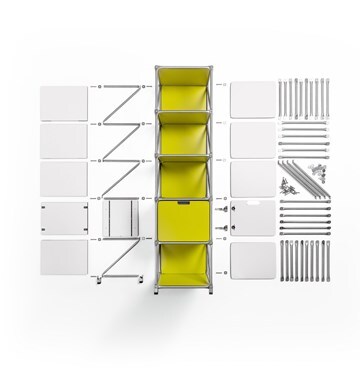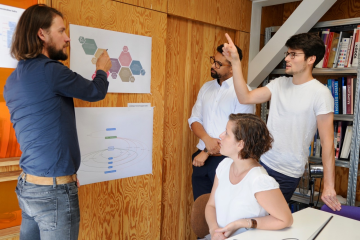"PERMA" picks up on the growing social awareness for more sustainability and aims to establish a resource-efficient circular economy in furniture and object construction. New types of product life cycles and manufacturer-independent compatibility guidelines enable sustainable and flexible reuse and further use of products in a value-preserving form. The development of innovative business models creates a platform for re-use, up-, down- and recycling.
Recyclable design
Decreasing raw material volumes are leading to a current change in environmental awareness. On the other hand, the demand for materials in the furniture industry is increasing due to increasing flexibility requirements resulting from rapidly changing forms of office organization such as co-working and open space. In other industries, such as exhibition, trade fair and scenery construction, the useful life of the equipment used is significantly shorter than its actual service life as well. By intervening early in the design and planning processes, products are created whose basic concept serves an increased usage and service life in cycle-oriented business models.

In order to optimise raw material efficiency in terms of holistic reuse and recycling, the ""PERMA"" project consortium is developing an open product and raw material platform. Based on the three-pillar model for sustainability - economic, ecological and social - innovative business models are being developed. The use of environmentally friendly materials and modularity integrated into the product design as well as cross-manufacturer compatibility open up new types of product life cycles. Parameterized modularity in addition to secondary use of the products and their subcomponents, recyclable reuse options through up- and downcycling are first being investigated. Only then a return of raw materials via recycling is considered.
The basis for this is a technically implemented, holistic representation of occurring product structures and life cycles. Within the utilization concept, manufacturing characteristics and criteria are collected, with which reuse parameters are defined. New as well as used furniture and material components of various actors in the furniture and equipment industry can thus be made available for further use via the platform with corresponding parameterisation of their product and quality characteristics.
Parameterized modularity
In addition to a secondary use of the products and their sub-components, recyclable reuse possibilities through up- and downcycling are being investigated. Only finally will the return of raw materials via recycling be considered. The basis for this is a technically implemented, holistic representation of occurring product structures and life cycles.
Within the utilization concept, manufacturing characteristics and criteria are collected, with which reuse parameters are defined. New as well as used furniture and material components of various actors in the furniture and equipment industry can thus be made available for further use via the platform with corresponding parameterisation of their product and quality characteristics.

Open IT platform
Initially, the two manufacturing companies SYSTEM 180 GmbH and kubix GmbH will work together to develop innovative business models. Derived from this, product structures and application requirements will be discussed, which will serve as a basis for the creation of the platform. Furthermore, an evaluation matrix of recyclable product and quality features will be established with the participating scientific institutions, the Eberswalde University of Applied Sciences and the Technical University of Berlin. Finally, corresponding results will decisively determine the structure of the platform, the prototypical installation of which will be carried out by the IT company StoneOne GmbH.
With an appropriate process framework and a methodological toolbox as well as design rules, participating companies will be supported in the resource-efficient design of products throughout the entire product development process. By centralising processes and activities within the platform, the positive resource effects are increased in the form of extended service life and intelligent, cross-sector business models for reuse and further use throughout the entire cycle.
By opening up the platform to various stakeholders - from raw material suppliers to users - a large community can be reached and resource efficiency along the entire furniture and component cycle can be optimally designed. Cross-manufacturer combination options for modular components contribute significantly to increasing flexibility and the overall value proposition for customers.
Results (Status June 2022)
The two manufacturing companies have developed circular business models that follow the "Product as a Service" (PaaS) approach. Furniture and equipment are made available to the customer, but product ownership remains with the cooperating manufacturer. At the end of the usage period, the products are taken back by the manufacturer, so that the products remain his responsibility. The result is that products are designed and developed to meet the requirements for a long service life. For this purpose, basic design principles have been drafted that define these requirements.
Since the number of repair or remanufacturing procedures associated with costs is to be reduced without diminishing the potential for reusability of the products offered, a reusability label was designed which presents the hierarchically ordered product states separately in the respective categories "appearance" and "functionality". This gives end customers the opportunity, for example, to recognize a product as fully usable despite possible visual defects and thus to use it again or continue to use it.
From an economic point of view, the necessary repair, refurbishment and further use procedures are to be optimized in terms of time and effort.
The digital platform being developed is the link and heart of these considerations. It not only enables the management of PaaS business models, but also the exchange within the community about design principles, the assignment of reusability labels as well as the governance of service providers. To date, the theoretical basis has been created and then implemented in the form of a wireframe model, which enables continuous further development.
Publications
Final Report Part I (short, German, 2024)
Final Report Part II (German, 2024)
Project flyer of the funding measure (German / English) (March 2021)
The project flyers offer an insight into the contents and goals of the ReziProK projects and present first results in each case.
Project sheets of the funding measure (German) (August 2019)
The project sheets provide a brief overview of the individual projects and their goals.
Contributions to the ReziProK Transfer Conference in June 2022
Poster (German) (June 2022)
Presentation (German) (June 2022)
Contributions to the ReziProK Kick-off event in December 2019
Poster - in German (December 2019)
Presentation - in German (December 2019)
- Futur article (puplished 2020)
- Title: The dawn of the circular furniture industry
- Authors: Antje Klemichen, Lisa Hagedorn
- Paper & Talk at CIRP Design Conference (puplished 2023)
- Title: Digital platform engineering to enable circular-economy core mechanism
- Authors: Juliane Balder, Caroline Mathi, Lisa Hagedorn, Rainer Stark
- Contribution to the "New digital Work" volume (submitted)
- Title: Development of an Open Innovation Knowledge Platform in the context of digital sovereignty
- Authors: Juliane Balder, Rainer Stark
- Article in the Journal for sustainable production and consumption (in progress)
- Title: A make-over of the furniture industry through platform based business models - a systematic literature review and use case analysis
- Authors: Fabian Wulf, Lisa Hagedorn, Leo Felix Munier, Antje Klemichen, Caroline Mathi, Rainer Stark, Alexander Pfriem
- Proceedings of the 20th Wood Technology Colloquium Dresden 28-29 April 2022
- Title: Reduce, Reuse, Recycle im Möbelsektor
- Authors: Martin Wozniak, Fabian Wulf, Leo Felix Munier, Axel Mund, Alexander Pfriem
Picture credits: System 180 GmbH; kubix GmbH
